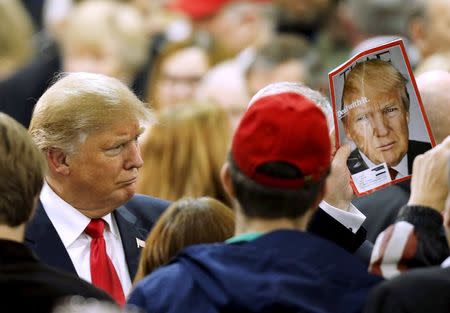Republicans Trump, Cruz seize spotlight at U.S. presidential debate

By Steve Holland and Emily Stephenson LAS VEGAS (Reuters) - Republican front-runner Donald Trump and surging challenger Ted Cruz will lead the party's presidential contenders in a debate on Tuesday, their first encounter since deadly attacks in Paris and San Bernardino propelled national security to the top of the U.S. campaign agenda. With seven weeks to go before the first nominating contest in Iowa, Trump, 69, has held or expanded his lead in national polls in the Republican race for the November 2016 presidential election but seen Cruz, 44, move past him in some Iowa surveys, making their debate encounter potentially combustible. A conservative U.S. senator from Texas, Cruz has tried to avoid direct confrontation with Trump, but Cruz's rise in the polls could make him a target for the combative billionaire at the nationally televised forum from Las Vegas due to begin at 9 p.m. ET on Tuesday (0200 GMT on Wednesday). Trump called Cruz a "maniac" on Sunday, an indication that he is prepared to attack Cruz as he has other rivals. "If you're a threat to him, he'll go after you," Republican strategist Rick Wilson said of Trump. Trump's unpredictable and controversial rhetoric has repeatedly put him at centre stage in the Republican race. He has dominated the campaign with his call for a total ban on Muslims entering the United States, following a married couple's Dec. 2 massacre of 14 people in San Bernardino, California, inspired by Islamic State. Most of his Republican rivals, as well as officials and leaders in the United States and around the globe, have criticized Trump's proposal although many of his supporters have voiced sympathy with his views. The moderators for CNN hosting the debate are likely to press the nine top-polling Republican candidates sharing the stage about Trump's Muslim proposal. But Trump has neither backed down nor dropped in national opinion polls. The latest Reuters/Ipsos poll, completed after Trump's comments, showed him leading the field with support of 33 percent of Republican voters. Cruz was second at 15 percent, followed by retired neurosurgeon Ben Carson at 12 percent, Marco Rubio, a U.S. senator from Florida, at 10 percent and former Florida Governor Jeb Bush at 9 percent. Also appearing in the main debate are New Jersey Governor Chris Christie, Ohio Governor John Kasich, U.S. Senator Rand Paul of Kentucky and former corporate executive Carly Fiorina. At the so-called “undercard” debate of low-polling candidates, held before the main event, former New York Governor George Pataki blasted Trump's Muslim proposal as “un-American, unconstitutional, and it is wrong.” Lindsey Graham, a U.S. senator from South Carolina with hawkish views on national security, was especially withering. "Donald Trump has done the one single thing you can’t do: Declare war on Islam itself,” Graham said, calling the proposal a coup for Islamic State militants trying to recruit new members. Former U.S. Senator Rick Santorum of Pennsylvania and former Arkansas Governor Mike Huckabee said, however, that Trump had brought up an important issue, stressing the need to protect American citizens from Islamic State militants. “He has touched a nerve because people are angry and afraid,” Huckabee said. (Writing by John Whitesides; Editing by Howard Goller)

